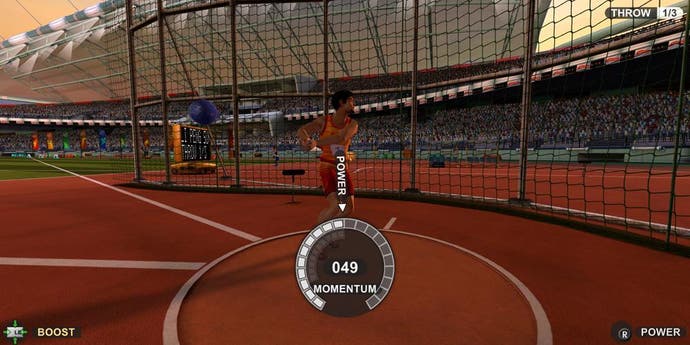Summer Athletics
Some are tedious.
The jumping and throwing events, too, include neat refinements of the well-worn waggle-then-set-your-angle approach, and are all enjoyable. Usually based around a three-step process, you rotate the right stick or waggle it (or jiggle, as they insist on saying) to build up power, set the angle by pushing the left stick up, and then hit the left trigger at the crucial moment to complete the throw/jump. While initially a little odd, after a few goes it becomes second nature, and makes it pretty straightforward thereafter to power through a whole series of events.
The only criticism is that you might find yourself getting very good at it very quickly, taking some of the challenge away early on. Other events, like High Jump, take an entirely different approach, aping Beijing's tactic of matching the timing of your athlete's run-up to build power, setting the jump power with the left trigger, then furiously rotating the right stick to set 'posture'. Most are, admittedly, variations on a theme, but if you're into quirky sport mini-games, you'll appreciate the effort here.
Like Beijing though, just when you feel you're getting into the whole thing, a few absolutely terrible events come along to spoil it. The swimming, in particular, has pointlessly exacting mechanics that deserve to be drowned. In theory, rotating both sticks in time with your swimmer's actions is doable, but you feel like the game's failing to read your actions. As arrows spin around a circle, you're supposed to match them and keep up, but during most attempts this simply doesn't happen. Whether it's a case of a bad workman blaming his tools is open for discussion, but when repeat practice fails to make you better at it, you know something's amiss.
The quality's patchy elsewhere, too, with rather boring middle-distance running events that require you to conserve stamina while clip-clopping a steady rhythm on the left and right sticks. Similar in concept, the cycling events also pass by in a thrum of tiresome slipstreaming and energy conservation, with little more involved than varying your power by moving the right stick up and down and steering with the left.

Matters improve with the rather enjoyable archery events, where a wobbly reticule and bow tension considerations make for an intuitive but challenging set of events. High diving, too, is handled better than Eurocom managed with its dreadful alternative in Beijing 2008. Uncannily similar in some respects, 49 Games remembers to make it playable and pretty, throwing in timing-based mechanics rather than potty dual-stick rotation nonsense.
On the whole Summer Athletics isn't as awful as it first appears to be. The quality and overall consistency is better than Beijing 2008, although it lacks visual flair and presentation, but once you factor in the crippling absence of online play, it becomes harder to make a call the better of the two. At times like this, we wish Konami would bring its excellent New Track & Field title to other consoles. Until then, Summer Athletics is about as good as it gets, which isn't saying an awful lot.
